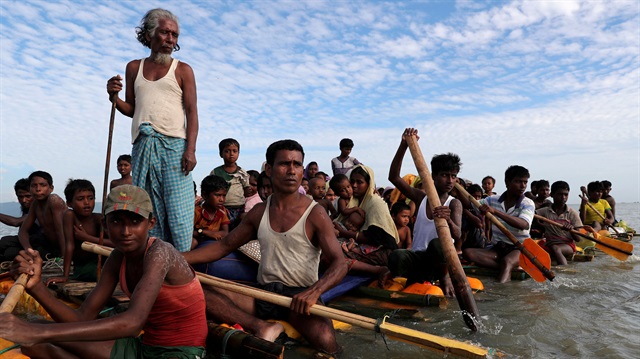

Rohingya refugees cross the Naf River with an improvised raft to reach to Bangladesh in Teknaf, Bangladesh, November 12, 2017.
Citing police survey, local media say refugees fear isolation, lack of relief and medical facilities in Bhasanchar Island
At least 87 percent of Rohingya refugees residing in makeshift camps in southern Bangladesh are unwilling to be relocated to a remote island on the Bay of Bengal, local media said on Monday citing a police report.
The report is based on a survey conducted by Cox’s Bazar district’s special branch of police, according to the New Age, a local daily.
Cox's Bazar has been hosting around a million refugees, including more than 750,000 people who came to Bangladesh following violence in the Rakhine state of western Myanmar last year.
Earlier, the Bangladeshi government had announced its plan to relocate the Rohingya refugees to Bhasanchar Island until their repatriation.
Citing the report, the daily noted Rohingya mentioned isolation of the location, fear of relief and medication facilities being hampered and isolation from their relatives among 10 causes for their unwillingness to go the island.
“The government will take representatives of all concern authorities, including Rohingya representatives, members of local and international NGOs and rights bodies to Bhasanchar Island before relocation to inspect the actual conditions there,” Muhammad Habibul Kabir Chowdhury, head of Refugee Affairs at Disaster Management And Relief Ministry, told Anadolu Agency.
“The relocation will not be implemented until the government is confirmed of providing better facilities than Ukhiya and Tekhnaf refugee camps in Cox’s Bazar,” he added referring the current refugee camps in the city.
Noting that Bangladesh is facing an environmental crisis, Chowdhury said that hills, forests are chopped down, and local people are facing over-populated problems as a result of the Rohingya influx.
Echoing the same views, Commissioner of Bangladesh Refugee Relief and Repatriation Commission (RRRC) Mohammad Abul Kalam said: “The government will implement the relocation process considering all related issues and humanitarian crisis of Rohingya people.”
Rehabilitation center
But both the officials said they were yet to see the police report.
In November last year, Bangladesh Navy floated tenders for the construction of a “rehabilitation center” on Bhasanchar Island for Rohingya refugees.
In the first phase, 100,000 Rohingya people will be relocated to Bhasanchar and the rest will be relocated later in line with the government plan, Chowdhury said.
On Aug. 25, 2017, Myanmar launched a major military crackdown on the Muslim ethnic minority, killing almost 24,000 civilians and forcing 750,000 others to flee to Bangladesh, according to the Ontario International Development Agency (OIDA).
In its recent report, Forced Migration of Rohingya: The Untold Experience, the OIDA increased the estimated number of murdered Rohingya to 23,962 (±881) from an earlier Doctors Without Borders figure of 9,400.
More than 34,000 Rohingya were also thrown into fires, while over 114,000 others were beaten, the OIDA report said, adding that 17,718 (±780) Rohingya women and girls were raped by the Myanmar army and police. More than 115,000 Rohingya houses were burned and 113,000 others were vandalized, it added.
The Rohingya, described by the UN as the world's most persecuted people, have faced heightened fears of attack since dozens were killed in communal violence in 2012.
The UN documented mass gang rapes, killings -- including of infants and young children -- brutal beatings, and disappearances committed by Myanmar state forces. In its report, UN investigators said such violations may have constituted crimes against humanity.
#Cox's Bazar
#refugees
#Relocation
#Rohingya


